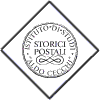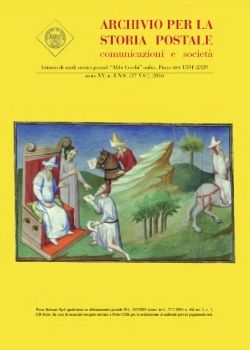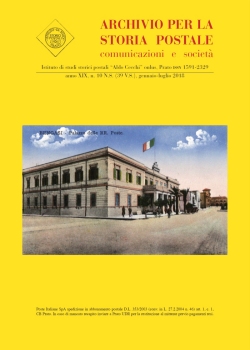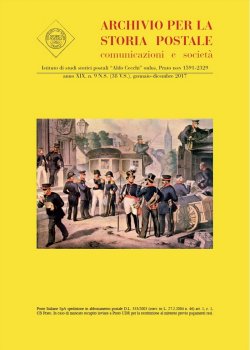Archivio per la storia postale N. 9 (38), gennaio-dicembre 2017, € 20,00
Indice
Andrea Giuntini, Editoriale«Io voglio scrivere... con tutta la libertà». Il piego violato nelle relazioni diplomatiche tra Napoli e Ragusa a metà Settecento
Massimiliano Pezzi, Università di Bari, pezzi.massimiliano@gmail.com
Title
«Io voglio scrivere…con tutta la libertà» (I want to write... freely). The case of the “broken despatch” in the diplomatic relationship between Naples and Ragusa in mid-18th century.
Parole chiave
Posta del Levante. Posta ragusea. Consoli ragusei. Consoli borbonici. Balcani. Peste. Diplomazia napoletana. Segreto epistolare. Scrittura cifrata.
Keywords
Levant postal service. Ragusan post. Ragusan consuls. Neapolitan consuls. Balkan. Plague. Neapolitan diplomacy. Secrecy of correspondence. Writing in cipher.
Riassunto
Sullo sfondo dell’organizzazione postale tra Napoli, Ragusa e Costantinopoli, l’increscioso episodio di Foča metteva in risalto alcuni problemi logistici del trasporto della corrispondenza del ripristinato servizio della Posta del Levante. Il diplomatico napoletano Tanucci si rendeva subito conto che il segreto epistolare era la prima cosa da garantire per accreditare il servizio postale napoletano tra Costantinopoli e l’Europa. L’inflessibilità della diplomazia e del governo di Carlo di Borbone serviva anche per sminuire alcuni inconvenienti che potevano minare il buon nome della struttura postale, perché poter scrivere liberamente non era un’aspirazione soltanto di Tanucci.
Abstract
In the background of the postal service among Naples, Ragusa and Constantinople, the Foča’s unpleasant event had emphasized some logistical problems concerning the mail delivery of the recently re-established Levant postal service. For this reason, the Neapolitan diplomat Tanucci immediately realized that ensuring the epistolary secret was the main thing required to promote the Neapolitan postal service between Constantinople and Europe. The inflexibility of Charles of Bourbon’s diplomacy and government also helped to lessen some inconveniences that might undermine the good reputation of the postal structure: Tanucci was not alone in wishing to write in liberty.
Comunicazioni e formazione dello Stato. Il servizio postale negli Stati tedeschi, 1815-1866
Zef Segal, Associate Fellow, Dept. of General History, Haifa University
Title
Communication and State construction: the Postal Service in German States, 1815-1866.
Parole chiave
Sistemi postali. Stati tedeschi. Formazione statale. Ottocento.
Keywords
Postal systems. German States. Nation building. 19th century.
Riassunto
Le comunicazioni svolgono un ruolo cruciale nel processo di trasformazione degli Stati in senso nazionale in epoca contemporanea. L’articolo mette in rilievo le complicate vicende relative agli Stati tedeschi nel periodo precedente l’unificazione del paese. In particolare i sistemi postali disegnano un contesto molto vario, plasmando lo sviluppo territoriale ed economico delle singole realtà statuali e condizionandone le modalità di formazione.
Abstract
Communications play a crucial role in the nation building process of countries in the contemporary era. The article highlights the complicated events concerning the German States in the period before the unification of the country. In particular, the postal systems draw a varied context, shaping the territorial and economic development of the several States, influencing the formation modalities.
L’inaugurazione dell’impianto di telefoto a Trieste da un fascicolo del Museo postale e telegrafico della Mitteleuropa
Chiara Simon, Museo postale e telegrafico della Mitteleuropa, simonchi@posteitaliane.it
Title
Opening of the Telephotograpic Station in Trieste, from a file of the Postal and Telegraphic Museum of Central Europe.
Parole chiave
Trieste. Telefoto. Museo postale e telegrafico della Mitteleuropa.
Keywords
Trieste. Telephotograph. Postal and Telegraphic Museum of Central Europe.
Riassunto
Un impianto per trasmissione e ricezione di telefoto venne aperto al pubblico a Trieste il 2 gennaio 1953.
Abstract
A station to transmit and receive telephotographs was opened to the public in Trieste on January 2, 1953.
Recensioni
Notiziario
Pubblicazioni dell’Istituto




